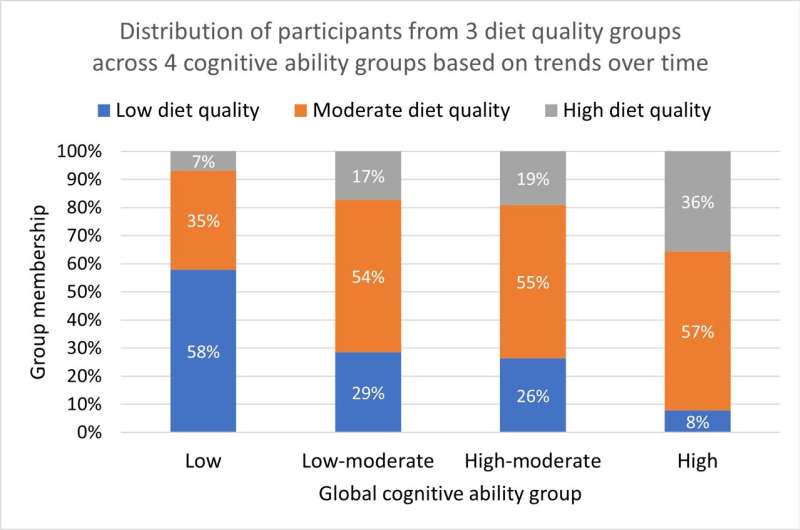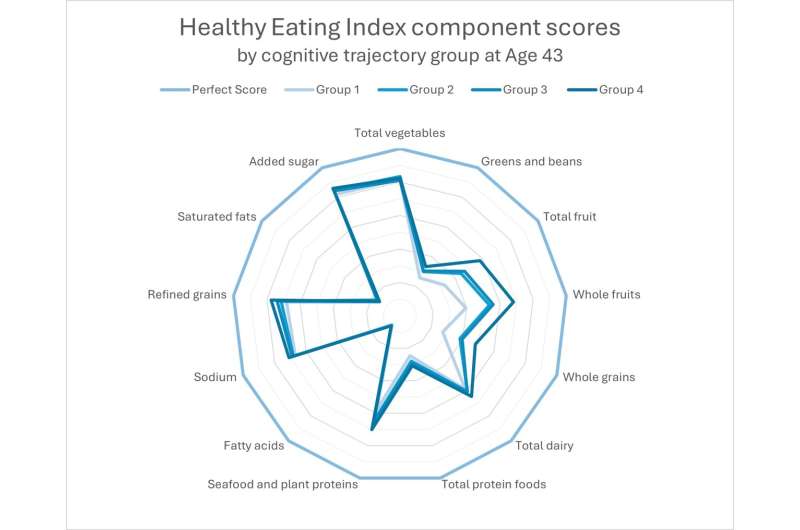This article has been reviewed according to Science X's editorial process and policies. Editors have highlighted the following attributes while ensuring the content's credibility:
fact-checked
trusted source
proofread
Study reveals strong links between the quality of a person's diet and cognitive ability over the course of life

Eating a high-quality diet in youth and middle age could help keep your brain functioning well in your senior years, according to new preliminary findings from a study that used data collected from over 3,000 people followed for nearly seven decades.
The research adds to a growing body of evidence that a healthy diet could help ward off Alzheimer's disease and age-related cognitive decline. Whereas most previous research on the topic has focused on eating habits of people in their 60s and 70s, the new study is the first to track diet and cognitive ability throughout the lifespan—from age 4 to 70—and suggests the links may start much earlier than previously recognized.
"These initial findings generally support current public health guidance that it is important to establish healthy dietary patterns early in life in order to support and maintain health throughout life," said Kelly Cara, Ph.D., a recent graduate of the Gerald J. and Dorothy R. Friedman School of Nutrition Science and Policy at Tufts University.
"Our findings also provide new evidence suggesting that improvements to dietary patterns up to midlife may influence cognitive performance and help mitigate, or lessen, cognitive decline in later years."
Cara presents the findings at NUTRITION 2024, the flagship annual meeting of the American Society for Nutrition held June 29–July 2 in Chicago.
Cognitive performance, or thinking ability, can keep improving well into middle age, but typically begins to decline after age 65. More severe conditions such as dementia can also develop alongside aging-related declines.
Researchers say that eating a healthy diet—in particular, a diet rich in plant-based foods that contain high levels of antioxidants and mono- and polyunsaturated fats—can support brain health by reducing oxidative stress and improving blood flow to the brain.
For the new research, scientists used data from 3,059 U.K. adults who were enrolled as children in a study called National Survey of Health and Development. Members of the cohort, called the 1946 British Birth Cohort, have provided data on dietary intakes, cognitive outcomes and other factors via questionnaires and tests over the course of more than 75 years.
Analyzing participants' dietary intakes at five timepoints in relation to their cognitive ability at seven timepoints, researchers found that dietary quality was closely linked with trends in general, or "global," cognitive ability. For example, only about 8% of people with low-quality diets sustained high cognitive ability and only about 7% of people with high-quality diets sustained low cognitive ability over time compared with their peers.

Cognitive ability can have important impacts on quality of life and independence as we age. For example, at age 68-70, participants in the highest cognitive group showed a much higher retention of working memory, processing speed and general cognitive performance compared to those in the lowest cognitive group.
In addition, nearly one-quarter of participants in the lowest cognitive group showed signs of dementia at this timepoint while none of those in the highest cognitive group showed signs of dementia.
While most people saw steady improvements in their dietary quality throughout adulthood, the researchers noted that slight differences in diet quality in childhood seemed to set the tone for later life dietary patterns, for better or worse. "This suggests that early life dietary intakes may influence our dietary decisions later in life, and the cumulative effects of diet over time are linked with the progression of our global cognitive abilities," said Cara.
To assess diet quality, the researchers used the 2020 Healthy Eating Index, which measures how closely one's diet aligns with the 2020-2025 Dietary Guidelines for Americans. Study participants who sustained the highest cognitive abilities over time relative to their peers tended to eat more recommended foods such as vegetables, fruits, legumes and whole grains and less sodium, added sugars and refined grains.
"Dietary patterns that are high in whole or less processed plant-food groups including leafy green vegetables, beans, whole fruits and whole grains may be most protective," said Cara. "Adjusting one's dietary intake at any age to incorporate more of these foods and to align more closely with current dietary recommendations is likely to improve our health in many ways, including our cognitive health."
Since the study participants were predominantly Caucasian individuals from across the U.K., the researchers said that further research would be needed to determine whether the results would apply to populations with greater racial, ethnic and dietary diversity. They also noted that changes in study focus and protocols over the course of the long-running study created some gaps and inconsistencies in data collection.
Despite these limitations, however, the researchers were able to create global cognitive ability percentile rank scores using data from multiple cognitive domains to evaluate how participants compared to their peers at each age and over time.
More information: Cara presents this research at 4:36-4:48 p.m. CDT on Monday, July 1, during the Timing of Food Intake and Dietary Patterns: Health Implications in Aging Populations session in McCormick Place (abstract; presentation details).


















